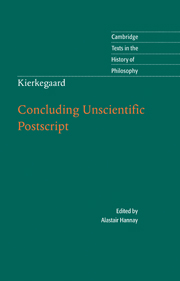Book contents
- Frontmatter
- Contents
- Introduction
- Chronology
- Further reading
- Note on the translation
- CONCLUDING UNSCIENTIFIC POSTSCRIPT TO THE PHILOSOPHICAL CRUMBS
- Preface
- Contents
- Introduction
- Part One The objective problem of Christianity's truth
- Part Two The subjective problem. The subject's relation to the truth of Christianity, or what it is to become a Christian
- 5 Conclusion
- Appendix: Understanding with the reader
- A first and last declaration by S. Kierkegaard
- Index
- Cambridge Texts in the History of Philosophy
5 - Conclusion
Published online by Cambridge University Press: 26 February 2010
- Frontmatter
- Contents
- Introduction
- Chronology
- Further reading
- Note on the translation
- CONCLUDING UNSCIENTIFIC POSTSCRIPT TO THE PHILOSOPHICAL CRUMBS
- Preface
- Contents
- Introduction
- Part One The objective problem of Christianity's truth
- Part Two The subjective problem. The subject's relation to the truth of Christianity, or what it is to become a Christian
- 5 Conclusion
- Appendix: Understanding with the reader
- A first and last declaration by S. Kierkegaard
- Index
- Cambridge Texts in the History of Philosophy
Summary
The present work has made it difficult to become a Christian, so difficult that the number of Christians among the cultivated in Christendom may not be very large – may not, because this is not something I can know. Whether my doing this is Christian, I do not decide. But going further than Christianity and fumbling in definitions once familiar to pagans, going further and then, in terms of proficiency in existing, falling far short of competing with pagans, that at least is not Christian. Nor is the difficulty made (in the experiment, for the book has no τέλος) in order for it to be hard for lay people to become Christians. For one thing, everyone can become a Christian; and for another, it is assumed here that everyone who says he is a Christian and has done the highest, actually is a Christian and indeed done the highest, unless in pushing himself importantly forward he prompts one, purely psychologically and to learn something for oneself, to look more closely into the matter. Woe to him who would judge hearts. But when a whole generation seems, though in various ways, to want to join en masse in going further, and when a whole generation aspires to objectivity, though this be understood in various ways, as the highest, whereby one ceases to be a Christian, if that is indeed what one was, surely this can prompt an individual into becoming aware of the difficulties.
- Type
- Chapter
- Information
- Kierkegaard: Concluding Unscientific Postscript , pp. 494 - 519Publisher: Cambridge University PressPrint publication year: 2009

